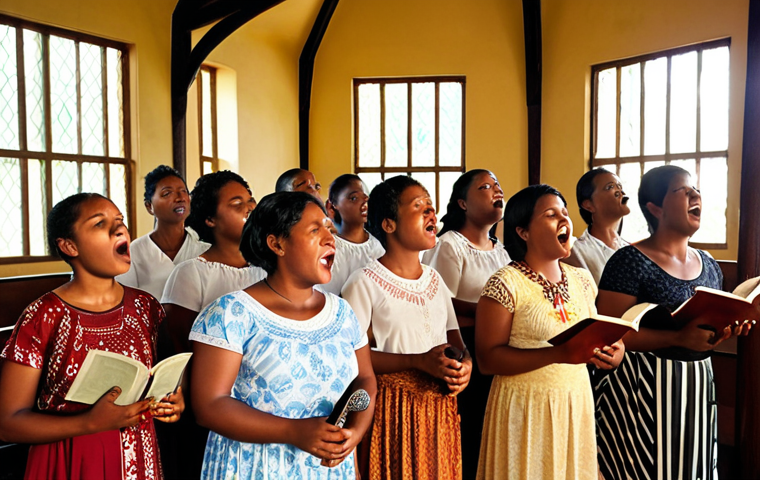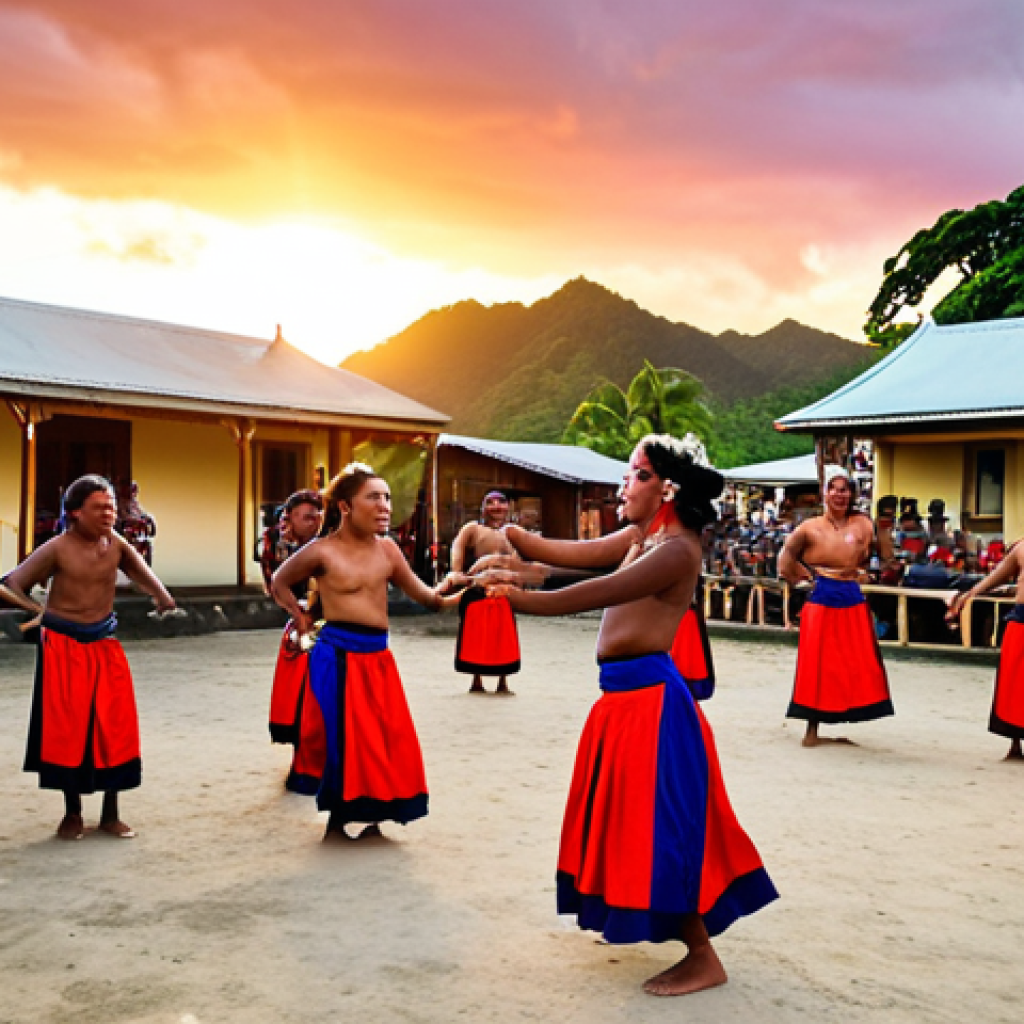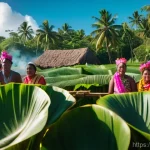Fiji, a tropical paradise known for its breathtaking beaches and vibrant culture, also boasts a rich musical heritage. From the rhythmic beats of traditional drums to the soul-stirring harmonies of vocal ensembles, Fijian music is an integral part of the island nation’s identity.
It’s more than just entertainment; it’s a way of storytelling, preserving history, and celebrating life. Having experienced a Meke performance firsthand, the energy and passion are truly captivating!
Traditional Fijian music is often intertwined with dance, creating a powerful and immersive cultural experience. Interestingly, modern Fijian music is also evolving, blending traditional sounds with contemporary influences, something I personally found fascinating.
Let’s delve deeper into the captivating world of Fijian traditional music in the article below.
Fiji, a tropical paradise known for its breathtaking beaches and vibrant culture, also boasts a rich musical heritage. From the rhythmic beats of traditional drums to the soul-stirring harmonies of vocal ensembles, Fijian music is an integral part of the island nation’s identity.
It’s more than just entertainment; it’s a way of storytelling, preserving history, and celebrating life. Having experienced a Meke performance firsthand, the energy and passion are truly captivating!
Traditional Fijian music is often intertwined with dance, creating a powerful and immersive cultural experience. Interestingly, modern Fijian music is also evolving, blending traditional sounds with contemporary influences, something I personally found fascinating.
Let’s delve deeper into the captivating world of Fijian traditional music.
The Heartbeat of Fiji: Traditional Instruments

Fijian music wouldn’t be what it is without its distinctive instruments. I remember being struck by the deep resonance of the *lali* drum during a village ceremony.
It’s not just an instrument; it’s a communication tool, a call to gather, and a symbol of community.
The Lali Drum: A Voice of the Islands
The *lali* is a large wooden slit drum that plays a crucial role in Fijian culture. Crafted from a hollowed-out log, the *lali* produces a deep, resonant sound that can be heard for miles.
I learned from a local artisan that different rhythms and patterns convey specific messages, such as announcements, warnings, or invitations to a *meke* performance.
Witnessing the skill and precision of the drummers was truly impressive. You can typically find these instruments being played in village squares, ceremonial events, and even at hotels showcasing cultural performances.
The Derua: Bamboo Rhythms
Another fascinating instrument is the *derua*, a bamboo stamping tube. The *derua* creates a rhythmic sound when struck against the ground or a hard surface.
Typically, several musicians will play *derua* together, each holding a different length of bamboo to create a complex, layered rhythm. I even tried my hand at playing the *derua* during a village visit.
Let’s just say it’s harder than it looks! The sounds are really organic and very authentic to the Fijian experience.
The Ukelele
The ukulele, while not originally Fijian, has been wholeheartedly adopted into Fijian culture, is another instrument you will hear everywhere. They strum beautiful songs, and it just reminds you of being on vacation.
Meke: Storytelling Through Song and Dance
The *meke* is arguably the most iconic form of Fijian traditional music and dance. It’s a vibrant performance that combines storytelling, song, and dance to depict historical events, legends, and daily life.
During my trip, I made it a point to attend a traditional *meke*, and it was an experience I’ll never forget.
The Choreography
The *meke* involves elaborate costumes, intricate choreography, and powerful vocal performances. Each movement and gesture tells a story, conveying the emotions and experiences of the characters involved.
I found it fascinating how the dancers moved in perfect synchronicity, their expressions mirroring the narrative of the song.
The Significance
The *meke* is more than just a performance; it’s a way of preserving and transmitting Fijian culture and history. The songs and dances are passed down through generations, ensuring that the stories and traditions of the past are kept alive.
I spoke with one of the performers who said that they were taught the *meke* by their grandparents and they are now passing it on to their children.
The Evolution of Fijian Music: Modern Influences
While traditional Fijian music remains a vital part of the culture, it’s also evolving with the times. Modern Fijian musicians are blending traditional sounds with contemporary influences, creating a unique and vibrant music scene.
Fusion
I discovered several local bands that are incorporating elements of reggae, pop, and hip-hop into their music, while still retaining the distinct characteristics of Fijian melodies and rhythms.
It’s a fascinating fusion of old and new, reflecting the dynamic nature of Fijian culture.
Popularity
Modern Fijian music is gaining popularity both within Fiji and internationally. Many Fijian artists are using their music to promote their culture and heritage to a global audience.
From my experience talking with people in the hostels, this music is great for relaxing, and it’s great to experience the local culture.
Harmonious Voices: The Importance of Vocal Music
Vocal music plays a significant role in Fijian musical traditions. Fijians are known for their exceptional vocal harmonies, which are often featured in both religious and secular music.
Choirs
Church choirs are particularly popular in Fiji, with many congregations boasting talented singers who perform traditional hymns and contemporary gospel songs.
I was lucky enough to attend a church service where the choir’s voices filled the space with such beauty and power. It was a truly moving experience.
Ensembles
Vocal ensembles also play a vital role in Fijian ceremonies and celebrations. These groups often perform traditional songs that tell stories of love, loss, and triumph.
The harmonies are incredibly intricate and beautiful, creating a mesmerizing and unforgettable experience. I was surprised by the diversity of sounds coming from one small group.
It really showed their talent.
Music and Spirituality: A Deep Connection
Music is deeply intertwined with spirituality in Fijian culture. Many traditional songs and dances are performed as part of religious ceremonies and rituals.
I noticed that there’s a sense of reverence and respect that permeates every musical performance.
Sacred Music
Sacred music is used to invoke the spirits of ancestors, seek blessings, and express gratitude to the gods. The melodies are often simple and repetitive, creating a meditative and trance-like state.
Celebration
Music is also used to celebrate important life events, such as births, weddings, and funerals. These celebrations often involve singing, dancing, and feasting, bringing the community together in a spirit of joy and camaraderie.
The Role of Music in Fijian Society
Music plays a vital role in Fijian society, serving as a means of communication, expression, and cultural preservation. It brings people together, strengthens community bonds, and promotes a sense of identity and belonging.
Community
I realized that music is an integral part of daily life in Fiji, from the rhythmic beats of the *lali* drum echoing through the villages to the harmonious voices of the church choirs.
It’s a constant reminder of the rich cultural heritage that defines this island nation.
Expression
Music provides an outlet for Fijians to express their emotions, share their stories, and celebrate their traditions. It’s a powerful tool for fostering understanding, empathy, and connection among people of different backgrounds.
It connects generations and is a very important part of their history.
Experiencing Fijian Music: Where to Find It
If you’re planning a trip to Fiji and want to experience the magic of Fijian music, there are plenty of opportunities to do so. From cultural shows to church services, you’ll find music everywhere you go.
Cultural Centers
Many resorts and cultural centers offer traditional *meke* performances and musical demonstrations. These shows provide a great introduction to Fijian culture and are a must-see for any visitor.
I’d recommend booking in advance to secure a spot.
Local Churches
Attending a local church service is another great way to experience Fijian music. The choirs are incredibly talented, and the atmosphere is warm and welcoming.
Just remember to dress respectfully and be mindful of the religious setting. The locals were incredibly welcoming. Here is some information about some of the cultural events you may encounter while visiting Fiji:
| Event | Description | Typical Music |
|---|---|---|
| Meke Performance | Traditional dance and storytelling | Lali drum, vocal harmonies |
| Church Service | Religious gathering with hymns | Choir singing, ukulele |
| Village Ceremony | Traditional rituals and celebrations | Lali drum, derua, vocal ensembles |
Fijian music is an absolute treasure, and I hope this guide has given you a deeper appreciation for its beauty and cultural significance. Whether you’re tapping your feet to the rhythm of the *lali* drum or swaying to the harmonies of a Fijian choir, music is one of the most important things to experience in Fiji.
When you’re in Fiji, remember to sit back, relax, and let the music transport you to this tropical paradise!
Wrapping Up
Fijian music offers a vibrant glimpse into the heart and soul of this island nation. It’s an experience that touches all the senses and leaves a lasting impression. When you explore Fiji, make sure to immerse yourself in its music to enrich your journey.
From traditional instruments to modern influences, music in Fiji is a constant celebration of life, culture, and community. I hope my personal experiences have inspired you to discover the magic of Fijian music for yourself.
So, next time you find yourself dreaming of a tropical getaway, remember the enchanting melodies of Fiji and let the music guide you to a world of rhythm, harmony, and joy. You won’t regret it!
Good to Know Information
1. Meke Performances: Don’t miss a live *meke* performance. These cultural shows often take place at resorts and cultural centers. Check schedules in advance!
2. Church Services: Attend a local church service to experience the powerful vocal harmonies of Fijian choirs. Services are typically held on Sundays.
3. Village Visits: Consider a guided village tour where you can learn about traditional instruments and even try playing the *derua* or *lali*.
4. Music Festivals: Keep an eye out for local music festivals or events. These can be a great way to discover modern Fijian artists and musical styles.
5. Learn Some Fijian Songs: Learning a few basic Fijian songs or phrases can enhance your experience and show respect for the local culture.
Key Takeaways
Fijian traditional music is deeply rooted in the culture. It includes the use of unique instruments like the *lali* drum and *derua*, which play essential roles in ceremonies and storytelling.
The *meke* is a quintessential Fijian performance. This blends music, dance, and storytelling to preserve and transmit historical events and cultural traditions.
Modern Fijian music fuses traditional sounds with contemporary influences. This fusion makes for a dynamic and popular music scene both locally and internationally.
Vocal music and harmonies are extremely important in Fijian culture. They are a key feature in church choirs and vocal ensembles, contributing to both religious and secular music.
Attending cultural shows, church services, or village visits are great ways to experience Fijian music. These experiences offers an immersion into the cultural richness of Fiji.
Frequently Asked Questions (FAQ) 📖
Q: What’s the most striking thing about experiencing Fijian music live?
A: Honestly, it’s the sheer energy and passion that radiates from the performers. I remember seeing a Meke performance and being completely blown away by the intensity and the way the music and dance told a story.
It’s an experience that really sticks with you. The rhythmic drums just get into your soul, you know?
Q: How is traditional Fijian music changing in modern times?
A: That’s a great question! It’s not staying stagnant, that’s for sure. Modern Fijian artists are creatively blending those ancient sounds with contemporary influences like pop and reggae.
I think it’s fascinating because it’s keeping the tradition alive while also making it relevant and appealing to younger generations. You might hear traditional instruments combined with electronic beats – it’s a cool mix!
Q: Besides entertainment, what’s the real importance of Fijian music to the culture?
A: It goes way beyond just entertainment. Fijian music is deeply intertwined with their history and storytelling. It’s a way to preserve their heritage and pass down stories from one generation to the next.
It’s a way of celebrating life, marking important events, and keeping their traditions alive. It felt like much more than just a performance; it was a window into the heart of Fijian culture.
📚 References
Wikipedia Encyclopedia
구글 검색 결과
구글 검색 결과
구글 검색 결과
구글 검색 결과
구글 검색 결과






